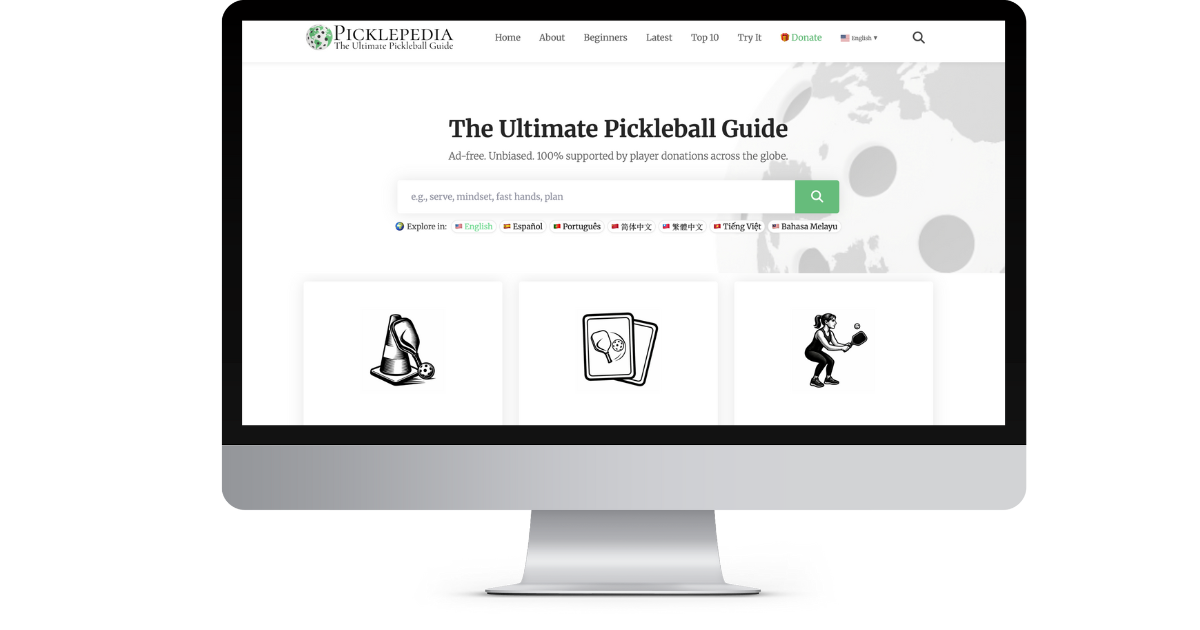Forget Grokipedia—Why Picklepedia Might Actually Make You a Better Pickleball Player
When Elon Musk launched Grokipedia last week, the internet collectively rolled its eyes. It’s marketed as an AI-powered encyclopedia that can explain “everything from particle physics to philosophy.” Meanwhile, most of us are just trying to figure out why our dink game falls apart halfway through a match.
That’s where Picklepedia comes in—the self-described “player-built, ad-free knowledge hub” that’s aiming to organize everything you’ve ever wanted to know about pickleball. It’s what happens when everyday players, coaches, and fans decide to take learning into their own hands. It honestly might be one of the smartest things to hit the pickleball world this year.
Because let’s be real—finding reliable, clear, and consistent pickleball information online is still a mess.
Where We Actually Learn (and Why It’s a Disaster)
If you’ve ever searched “how to hit a third shot drop” on YouTube, you know the chaos: ten videos, ten different explanations, half filmed in someone’s driveway with a GoPro. And don’t get us started on the clickbait blogs loaded with affiliate links and questionable “expertise.”
That’s part of why Empower Pickleball started publishing Tips & Tricks and Health & Wellness pieces in the first place. Every tutorial and training breakdown on our site comes directly from certified coaches and professionals who’ve spent years on the court. It’s real advice, not recycled fluff.
Still, we love seeing other platforms—like Picklepedia—push pickleball education forward. Their approach is hands-on, structured, and interactive, with some tools that make practice feel like progress.
Picklepedia in Practice
Picklepedia calls itself a “movement to protect and grow the soul of pickleball,” which sounds lofty until you dig into what they’re actually doing. They’ve created full-blown learning tools designed to make training more interactive and consistent—things you can actually use to track your progress.
Take the Drill Dash Pro, for example. It’s basically your digital accountability partner:
Track your streaks by marking drills done each day.
Add notes and takeaways as you go.
Level up through curated drill progressions that become more challenging as you improve.
Use the dice button to randomize drills based on your filters (type, level, setup).
It’s simple, clean, and—most importantly—built for players who don't want to waste time guessing what to practice next.
Their site also includes long-form guides that cover technique, nutrition, and performance. Some read like mini textbooks (a little dense, sure), but they’re fact-based and genuinely useful for players looking to fine-tune their game.
The Bigger Picture: A Shift in How We Learn
There’s something bigger happening here. As the sport explodes, so does the noise. Amid the YouTube gurus, TikTok clips, and ad-stuffed websites, players are craving one thing: trust.
Picklepedia’s rise shows that pickleball education doesn’t have to come from a brand or a corporation—it can come from the community itself. That’s what makes it special.
Empower Pickleball exists right in that same lane—bridging knowledge and community. Our mission has always been to connect players to the why behind the sport while giving them tools and tips to play smarter and healthier. We highlight the people building pickleball culture and the experts improving how it’s played.
Where Picklepedia offers the drills, we offer the deeper connection—the context, stories, and coaching insight that make all those drills matter. Together, they represent two sides of pickleball’s evolution: education and empowerment.
So, Should You Check It Out?
Yeah, probably. If you’re the kind of player who thrives on structure and progress tracking, Picklepedia’s worth exploring. Their Drill Dash tool alone might help you practice more intentionally. Then come back here to pair that structure with inspiration, real stories, and the latest expert tips from Empower Pickleball’s coaching team.
Because whether you’re logging drills on Picklepedia or reading about how a small-town league is building inclusive courts, the point is the same: you’re growing your game and your connection to it.
And in a world where billionaires are teaching AI to explain black holes, we’ll be sticking to explaining the kitchen rules.


